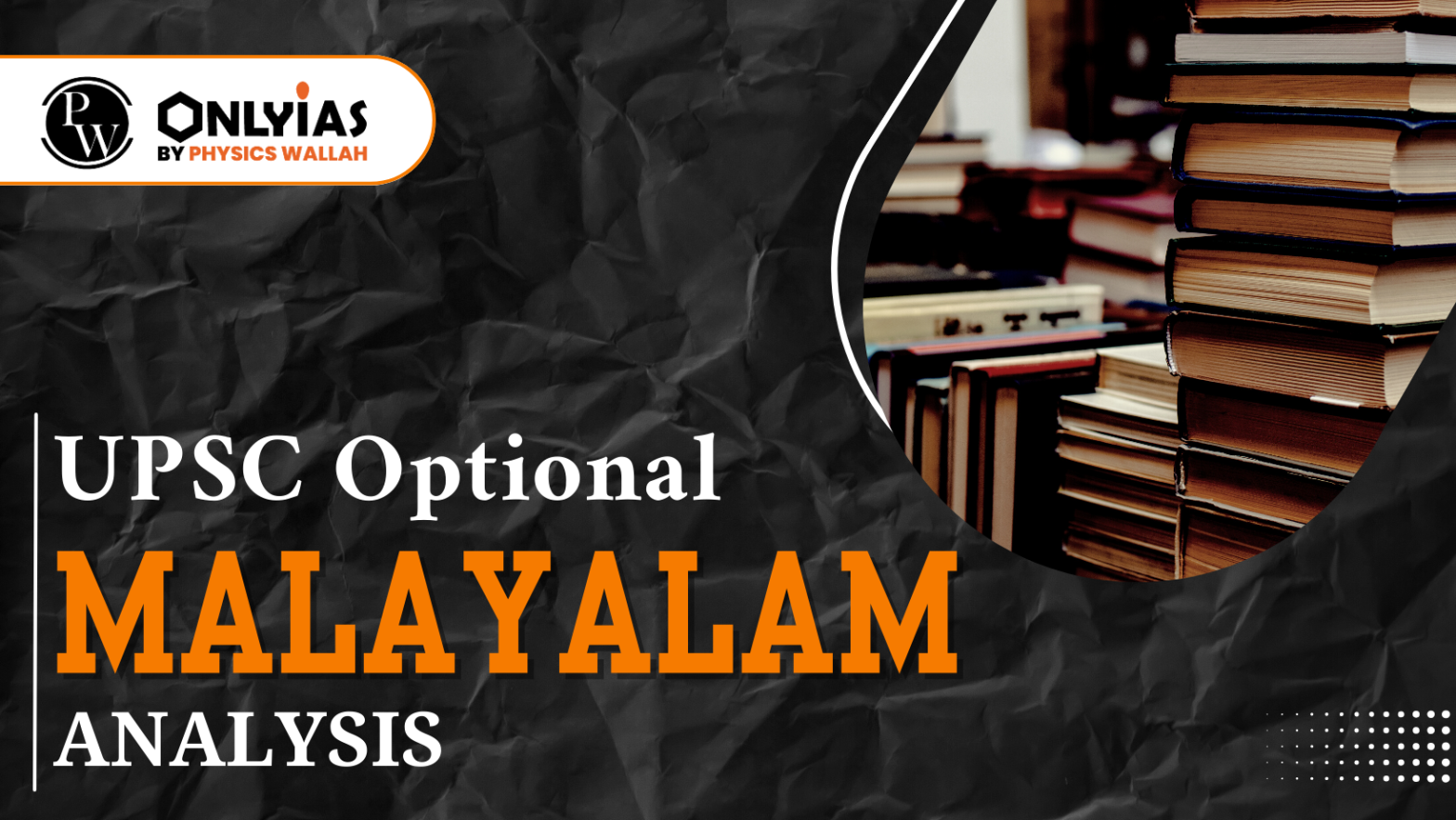UPSC Malayalam Optional consists of 2 papers each carrying 250 marks. Read detailed information about UPSC Malayalam Optional Paper, Success Rate, Analysis, Previous Year Questions and Preparation Strategy.

In the UPSC Mains exam, Malayalam optional subject consists of two papers, specifically Paper I and Paper II. Each of these papers carries a weightage of 250 marks, summing up to a total of 500 marks for this optional subject. Among the various optional subjects offered by UPSC, Malayalam is one of the 48 choices available to candidates.
| Paper 1 | Paper 2 |
|---|---|
| UPSC Malayalam Paper 1 | UPSC Malayalam Paper 2 |
Let us look the syllabus for the Malayalam optional subject in the UPSC mains exam.
In the UPSC examination pattern, there are two optional papers, each carrying a weightage of 250 marks. This makes the total optional marks to 500.
UPSC Malayalam Optional Question Papers from 2018 to 2022 are readily available for aspirants seeking to enhance their preparation. We provide access to the UPSC Malayalam optional question papers in PDF format, an invaluable resource for your preparation.
| UPSC Malayalam Optional Previous Year Question Papers | |
|---|---|
| Year | UPSC Malayalam Optional Question Papers PDF Link |
| 2022 | UPSC Malayalam Optional Paper 1 |
| 2021 | UPSC Malayalam Optional Paper 1 |
| 2020 | UPSC Malayalam Optional Paper 1 |
| 2019 | UPSC Malayalam Optional Paper 1 |
| 2018 | UPSC Malayalam Optional Paper 1 |
The table below offers a comprehensive overview of the success rate achieved by candidates who opted for Malayalam throughout the year.
| UPSC Malayalam Optional Success Rate | |||
|---|---|---|---|
| Year | Number of Candidates with Malayalam Optional | Number of Candidates Selected | Success Rate (%) |
| 2020 | 93 | 10 | 10.8% |
| 2019 | 105 | 13 | 12.4% |
| 2018 | 85 | 9 | 10.6% |
| 2017 | 111 | 8 | 7.2% |
| 2016 | 90 | 11 | 12.2% |
UPSC Malayalam Paper I primarily focuses on theoretical aspects. It necessitates a profound understanding of the language’s characteristics, historical origins, and related components. To excel in this paper, candidates are encouraged to engage in thorough reading and comprehensive comprehension of the subject matter.
UPSC Malayalam Paper II primarily focuses on various literary compositions. Many of these works may have been covered by students during their school or college education if they had Malayalam as a subject. To excel in this paper, it’s essential to grasp the subtle nuances of the stories, comprehend the characters in all their complexities, and critically evaluate the literary works. To develop a comprehensive understanding, reading critical reviews of these works by eminent critics is valuable, as it provides multiple perspectives on the literature.
Analyzing the UPSC Malayalam Optional Question Paper holds significant importance for UPSC aspirants. It offers valuable insights into the examination, allowing candidates to gain a better understanding of various aspects. Through this analysis, aspirants can ascertain the typical question patterns, assess the level of difficulty, and identify any recurring questions. Such an examination analysis is highly beneficial as it provides a deeper understanding of the competitive landscape. Whether you are a newcomer to UPSC preparation or have been actively preparing, a thorough examination of the UPSC Malayalam Optional Question Paper can substantially enhance your prospects of success.
Here are the Advantages and Disadvantages of choosing Malayalam Literature as an optional subject for the UPSC Civil Services Examination:
UPSC Malayalam Optional Advantages:
Scoring Potential: Malayalam literature is generally considered a scoring optional subject for UPSC as it has a relatively less vast syllabus compared to some other subjects, and the questions are straightforward.
Personal Interest: If you have a personal interest in Malayalam language and literature, it can be a fulfilling and enjoyable subject to study.
Overlap with General Studies: Some topics in Malayalam literature, especially those related to the culture, history, and society of Kerala, can have overlaps with the general studies papers, making it easier to integrate your preparation.
UPSC Malayalam Optional Disadvantages:
Limited Study Material: Finding comprehensive and UPSC-specific study material for Malayalam literature can be challenging. As a result, you may need to rely on a variety of sources, including textbooks, literary critiques, and academic publications.
Language Proficiency: You should have a strong command of the Malayalam language to excel in this optional. If you are not proficient in Malayalam, it can be a challenging subject to master.
Subjectivity: Malayalam literature is subjective in nature, and success in this optional depends on your interpretation and analysis of literary works, which may not have a definite right or wrong answer.
Scoring Depends on Writing Skills: While Malayalam literature can be scoring, it also depends on your writing skills and the ability to express your thoughts effectively in the language.
Limited Coaching: Compared to more popular optional subjects, coaching and guidance for Malayalam literature may be limited, making self-study essential.
Paper I of the UPSC Malayalam Optional covers topics related to the history and evolution of the Malayalam language, its literature, and the contributions of renowned Malayalam writers.
Yes, proficiency in the Malayalam language is essential as both papers involve reading, writing, and understanding Malayalam literature. Candidates should be comfortable with the language's script, grammar, and vocabulary.
Malayalam literature is generally considered a scoring optional subject due to its manageable syllabus and straightforward questions. However, your performance also depends on your comprehension and analytical skills.
Coaching for Malayalam literature may be limited compared to other popular optional subjects. However, you can inquire at reputed coaching centers for UPSC preparation to check if they offer guidance for Malayalam literature.
While being a native speaker can be an advantage, it's not mandatory. Candidates with a strong interest in Malayalam literature and a good grasp of the language can also excel in this optional subject.
<div class="new-fform">
</div>